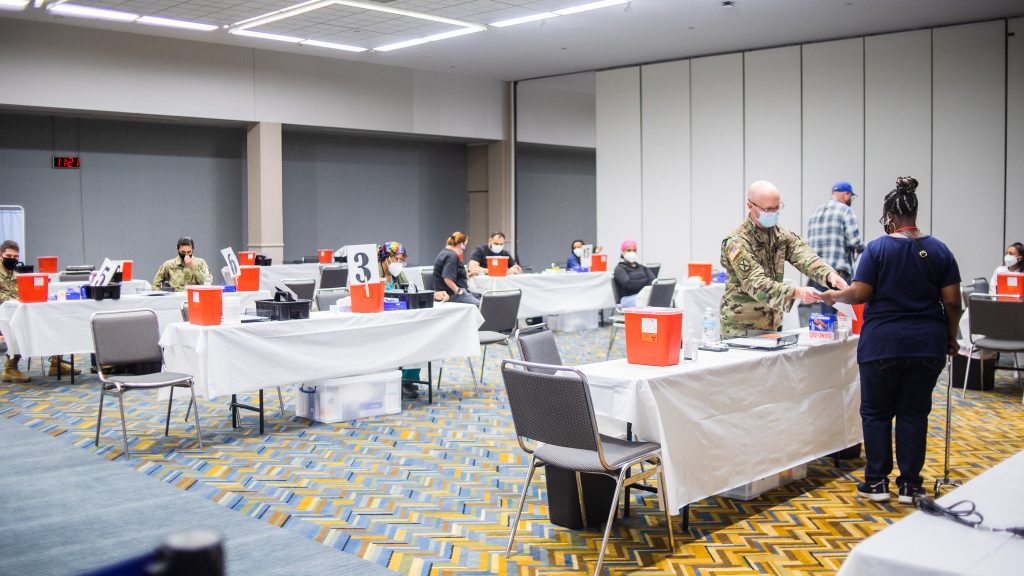How To Solve Vaccine Hesitancy, Refusal and Access in Communities Like Detroit
Dr. Abdul El-Sayed, the city’s former health director, says Detroit has a “last-mile problem,” which can be addressed.

Michigan’s efforts to vaccinate residents are chugging along. As of late last week, the state had administered more than 6 million doses, and we’re getting close to half of all Michiganders receiving at least one dose of a vaccine. A third are now fully vaccinated.
“If we’re serious about solving the problem, proof’s in the pudding, we’ve got to get those numbers up and we’ve got to be thinking about this problem as one problem rather than as two separate problems that have two separate solutions.” –Dr. Abdul El-Sayed, former director of the Detroit Health Department
But Detroit and other cities lag behind. Only 30% of Detroiters have received at least a single dose. To try to address the slow rollout, the city is offering walk-up vaccinations for residents at TCF Center, Northwest Activities Center, Farewell Recreational Center and the Samaritan Center. No appointments are needed for those clinics. But there’s concern that vaccines are still not easy enough for many Detroiters to access. And the bigger concern is that perhaps there’s not much demand here. That issue of vaccine hesitancy or refusal could lead to the pandemic dragging on longer than necessary.
Listen: Possible solutions to vaccine hesitancy, refusal and access issues.
Guests
Dr. Abdul El-Sayed is a public health physician and the former director of the Detroit Health Department. He says the city and others like it have a “last-mile problem,” which he says can be addressed through public policy initiatives.
“It’s actually a real challenge that anyone trying to deliver anything has, which is that the last mile of any delivery is always the most complex,” says El-Sayed, who notes that access to transit and normal business hours is limited, especially for people experiencing poverty. “If we’re serious about solving the vaccine problem in a community like Detroit, we’ve got to be really, really serious about this last-mile problem.”
“My sense of this is that we’ve got to bring the solution to the demand problem and the solution to the supply problem into one space,” he continues. “I would love to see vaccinators going door-to-door with vaccine available, figuring out how to make sure that those vaccines can stay refrigerated in a van and say, ‘Listen, here’s why we think it’s so critical for you to do this, we’ve got vaccine here in you’re interested in doing that.'”
“If we think about having the vaccine available in that moment when someone surpasses their vaccine hesitancy and is willing and the solution to the last-mile problem is right there for them, I think we’d have a lot more success. Of course, logistically, this is really hard to do. And that’s why I don’t take anything away from efforts that state and local officials are putting in. But it is to say that if we’re serious about solving the problem, proof’s in the pudding, we’ve got to get those numbers up and we’ve got to be thinking about this problem as one problem rather than as two separate problems that have two separate solutions,” says El-Sayed.
Daniel Engber is a senior editor at The Atlantic. He wrote a piece last month titled “America Is Now in the Hands of the Vaccine-Hesitant.”
“I’m kind of a vaccine hesitancy nihilist,” says Engber. “I’ve come to think that these (public opinion polling) numbers are just so sticky. They don’t really move … In January it looked like vaccine acceptance was on the rise. It seemed to me, just intuitively, that as the end of the pandemic came into view, people would get more excited about a way out.”
“It’s just not really happening that way,” he continues, noting that public policy can make a difference in how many people eventually get vaccinated. He says he thinks that difference is likely to be between a “floor” of 70% of adults being fully vaccinated, and a “ceiling” of around 80%.
Trusted, accurate, up-to-date
WDET is here to keep you informed on essential information, news and resources related to COVID-19.
This is a stressful, insecure time for many. So it’s more important than ever for you, our listeners and readers, who are able to donate to keep supporting WDET’s mission. Please make a gift today.
